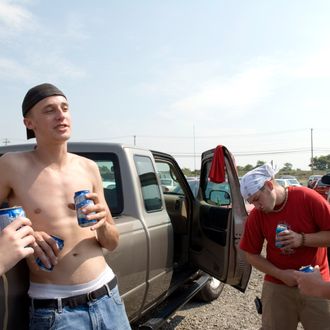
We know kids drink a lot, in part, because other kids drink a lot. Beyond that, though, the details get a little hazy. Do they drink because their friends are drinking a lot? Or do they drink because they think kids their age are drinking a lot, in general? New research presented at the American Public Health Association’s Annual Meeting and Exposition in New Orleans yesterday by Jonathon Beckmeyer, a public-health researcher at Indiana University, suggests that the influence of close friends matters a lot more.
“We’ve known for a long time that friends and peers have an influence on individual alcohol use, but there are no common studies that distinguished between the broader peer group and the friend group’s influence on those decisions,” Beckmeyer said in the press release. To try to suss out that distinction, he took data from the National Institute of Child Health and Human Development’s Study of Early Child Care and Youth Development, in which 15-year-olds were asked about their drinking habits.
Beckmeyer found that close friends matter a lot more. “We’re spending our time changing perceptions of the broader peer group, but really what might be the more key determinant of teen alcohol use is what’s going on in their own friend group,” he said. On the one hand, this isn’t terribly surprising, but on the other researchers who do this kind of work often refer to the notion of pluralistic ignorance — that is, everyone thinking that everyone else (in a whole school, say) is drinking a lot. If the important peer effects are more localized than that, it’s an important thing to know.




